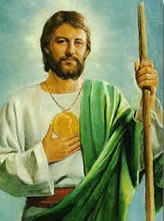The Monthly Note
August 2017
One Sunday in July, I passed in front of a church and the bells began to ring. For years, I have not heard so closely, for the Oratory of St. Jude and the Rosary is located in the church of the Dominicans has none. Why the bells of the churches ring?
The bells are for the life of the Christian community: their rings mark the times of prayer, bring together the People of God for liturgical celebrations, warn the faithful of the joys and sorrows of each one, on the occasion of baptisms, weddings and burials. Also it’s for serious events that affect the life of the Church or the City; before they announced a war or a fire.
Historically, on November 27, 1095, Pope Urban II took advantage of a Council in Clermont to appeal to the knights to make the trip to Jerusalem and expel the Muslims. The Ottomans threatened to break down the Christian Eastern Empire and multiplied the obstacles to the pilgrimages to the Holy Land, on the tomb of Christ. Urban II had ordered, during the First Crusade, to pray to the Virgin at noon for those who had gone to defend the tomb of Christ.
In the 15th century, the Ottoman Empire undertook the conquest of the Kingdom of Hungary to extend Islam in Europe. On July 22, 1456, the Ottoman army besieged Belgrade and was defeated. At the time, this victory saved Christian Europe from the conquest by Islam. A few weeks before the battle, Pope Callixtus III had issued an ordinance for twelve strokes every day at noon from the church towers, a call to prayer for the Hungarian soldiers facing the Ottomans. On August 6, two days after he learned of the defeat of the Muslims, the Pope decided that the Transfiguration would be celebrate on that day and that the midday Angelus would be the daily celebration of this victory on the Muslims. For more than 561 years, the tradition of twelve strokes at noon refers to this battle won by the Christians of Hungary.
 In this month of the Feast of the Assumption of Mary, let us remember that the Angelus' prayer commemorates the message of God, transmitted to the Virgin Mary by the Archangel Gabriel, that she would become the Mother of the Savior. This practice has gradually declined. In Rome, however, every Sunday at noon, the crowd gathered under the Pope's windows to pray with him the Angelus, which he introduces by a short meditation and sometimes by a quick commentary on the actuality - happy or tragic - of the world.
In this month of the Feast of the Assumption of Mary, let us remember that the Angelus' prayer commemorates the message of God, transmitted to the Virgin Mary by the Archangel Gabriel, that she would become the Mother of the Savior. This practice has gradually declined. In Rome, however, every Sunday at noon, the crowd gathered under the Pope's windows to pray with him the Angelus, which he introduces by a short meditation and sometimes by a quick commentary on the actuality - happy or tragic - of the world.
My brother, my sister, you can count on real solidarity and the prayer of the Dominicans and the Friends of St. Jude. Every Thursday afternoon, together for the Rosary and the following Mass, united with you, we sincerely pray for you and all the intentions received during the week. Be confident, there's hope !
Fr. Henri de Longchamp, o.p., Director



 In this month of the Feast of the Assumption of Mary, let us remember that the Angelus' prayer commemorates the message of God, transmitted to the Virgin Mary by the Archangel Gabriel, that she would become the Mother of the Savior. This practice has gradually declined. In Rome, however, every Sunday at noon, the crowd gathered under the Pope's windows to pray with him the Angelus, which he introduces by a short meditation and sometimes by a quick commentary on the actuality - happy or tragic - of the world.
In this month of the Feast of the Assumption of Mary, let us remember that the Angelus' prayer commemorates the message of God, transmitted to the Virgin Mary by the Archangel Gabriel, that she would become the Mother of the Savior. This practice has gradually declined. In Rome, however, every Sunday at noon, the crowd gathered under the Pope's windows to pray with him the Angelus, which he introduces by a short meditation and sometimes by a quick commentary on the actuality - happy or tragic - of the world.